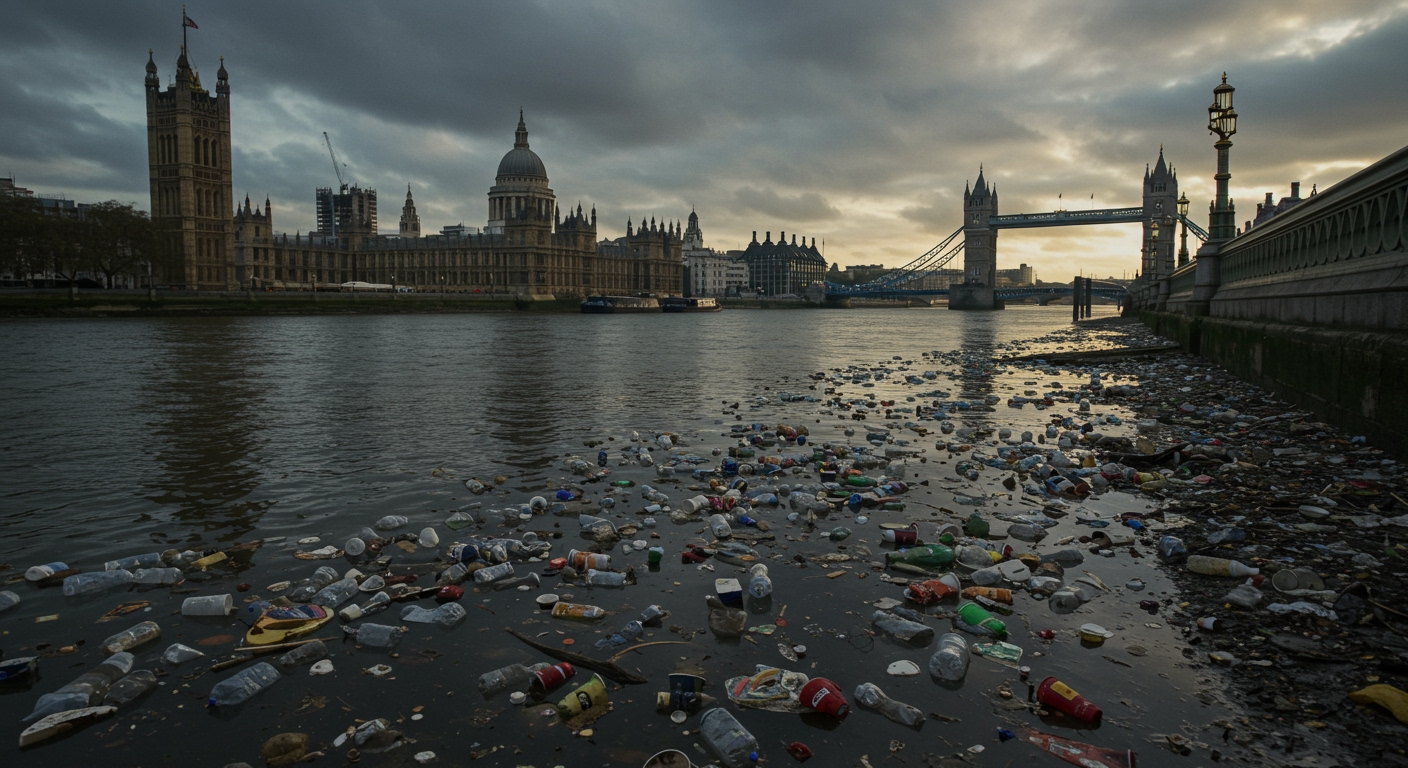Environmental Groups Urge Ban on Single-Use Plastic Cups Along London’s River Thames Amid Pollution Crisis
LONDON, UK – A prominent environmental organisation, In The Drink UK, operating as part of a broader coalition dedicated to the health and preservation of the nation’s waterways, is spearheading a crucial campaign calling for the urgent phasing out of single-use plastic cups by businesses operating along the banks of the iconic River Thames. The group’s advocacy is firmly rooted in comprehensive new research that starkly highlights the significant contribution of these disposable items to the persistent and visible problem of plastic pollution affecting the historic waterway that flows through the heart of the capital.
Understanding the Scope of the Problem
The foundation of the campaign is an extensive and meticulous investigation conducted by In The Drink UK over a considerable period of 18 months. This detailed survey focused on establishments situated directly adjacent to or in close proximity to the River Thames within London, encompassing a sample of 250 pubs and bars. The findings of this rigorous research paint a clear, albeit concerning, picture of current practices: a striking 69% of the surveyed venues were found to continue their reliance on single-use plastic cups for serving beverages, particularly during periods of high footfall or for patrons using outdoor areas near the river.
These lightweight, disposable cups pose a direct threat to the river’s cleanliness and ecological balance. Easily carried by gusts of wind, accidentally dropped by patrons, or improperly managed within waste streams, they frequently bypass conventional collection systems and inevitably enter the river directly. Once submerged or floating in the Thames, they do not biodegrade but instead contribute substantially to the accumulation of long-term plastic pollution. Over time, these cups break down into smaller pieces, including harmful microplastics, posing severe risks to aquatic wildlife and the overall health of the river’s ecosystem, in addition to creating unsightly litter that detracts from the Thames’s natural beauty and recreational appeal.
Flora Blathwayt, the Director of In The Drink UK, passionately articulated the severity of the environmental situation observed during their extensive research along the riverbanks. “There’s tonnes and tonnes of plastic in the Thames,” Ms. Blathwayt stated emphatically, drawing attention to the overwhelming volume of waste burdening the river. She specifically identified plastic cups as a particularly visible, prevalent, and easily recognisable form of pollution, noting that their distinct shape and material make them stand out among other debris. Crucially, Ms. Blathwayt highlighted that this specific, identifiable source of pollution is one that “can be stopped at its source,” positing that direct action targeting the businesses that dispense the cups represents a practical, efficient, and impactful intervention point to curb the flow of plastic into the waterway.
Calls for Action and Official Support
The campaign spearheaded by In The Drink UK, acting in concert with its wider coalition of like-minded environmental partners, presents a targeted and actionable solution. They are urging pubs, bars, and other relevant catering establishments located along the Thames corridor to make a definitive transition away from the use of single-use plastic cups. The proposed shift involves adopting reusable cup systems, implementing deposit return schemes, or utilising certified compostable alternatives where reusability is not feasible, with the overarching objective being to proactively prevent plastic waste from ever entering the river system, thereby significantly mitigating the environmental damage it causes.
Lending substantial institutional credibility and practical support to the environmental groups’ urgent call, the initiative has garnered the official backing of the Port of London Authority (PLA). As the statutory body endowed with the responsibility for managing and maintaining the tidal stretch of the River Thames, the PLA’s endorsement is entirely consistent with its existing, robust environmental stewardship commitments. This dedication is notably formalised and implemented through its comprehensive strategy known as the Clean Thames Plan. This plan outlines the authority’s multifaceted approach to combating all forms of pollution impacting the waterway, explicitly listing both larger plastic debris and the increasingly concerning issue of microplastics as key targets for reduction and removal efforts.
Emily McLean, a senior advisor at the PLA, provided valuable insight into the ongoing, significant operational challenges faced by the authority in keeping the Thames clean. Ms. McLean revealed the substantial scale of the task undertaken by the PLA’s dedicated operational teams who work tirelessly to remove debris from the river environment. She stated that the authority annually removes up to 200 tonnes of litter from the Thames. This staggering figure underscores the immense volume of waste, much of which comprises plastics, that unfortunately enters the river every year and necessitates costly, labour-intensive, and ongoing removal operations. This data point strongly reinforces the logical and environmental urgency of preventing pollution at its source, precisely as advocated by In The Drink UK and its coalition partners.
Towards a Cleaner Future for the Thames
The combined call to action from influential environmental groups and the clear, supportive stance of the Port of London Authority collectively signal a tangible and growing momentum for positive environmental change along London’s vital waterway. Implementing a phase-out of single-use plastic cups among the numerous establishments lining the riverbanks represents a practical, visible, and impactful step towards significantly reducing a prominent source of plastic pollution that directly threatens the health and appearance of the Thames.
Achieving this change effectively would necessitate close collaboration among various stakeholders, including riverside businesses themselves, dedicated environmental advocates, and regulatory bodies such as the PLA. Such a transition also presents a valuable opportunity for riverside venues to publicly embrace and champion sustainable business practices, thereby contributing directly to fostering a cleaner, healthier river environment. This improved state benefits not only the diverse array of aquatic wildlife that inhabits the Thames but also enhances public amenity, supports recreational use of the river, and reinforces the iconic status of the Thames itself as a clean and vibrant urban river. The targeted campaign by In The Drink UK focuses attention on a specific, actionable measure that holds the promise of yielding significant positive environmental impacts in the ongoing and critical effort to protect and preserve the River Thames for the benefit of both current and future generations.





